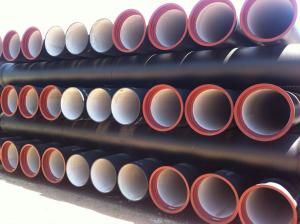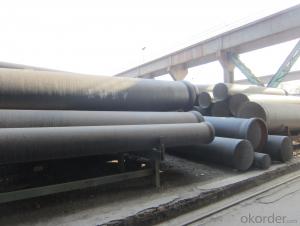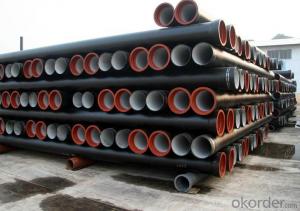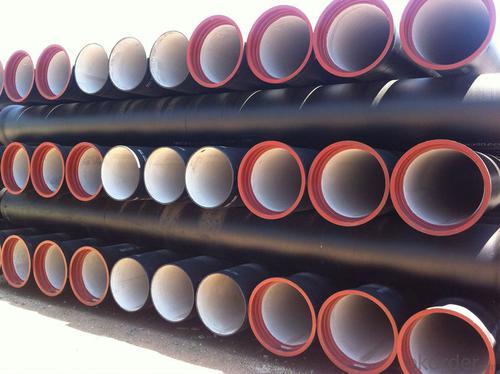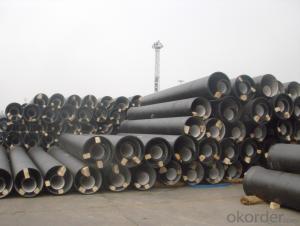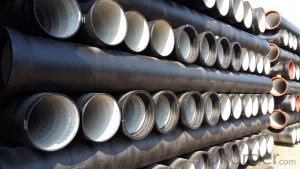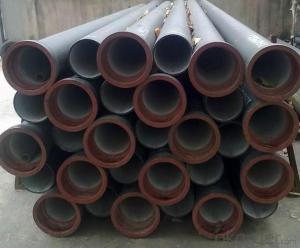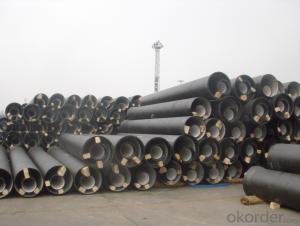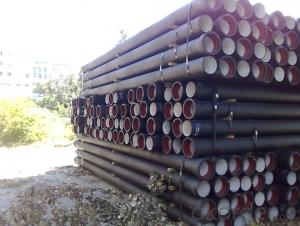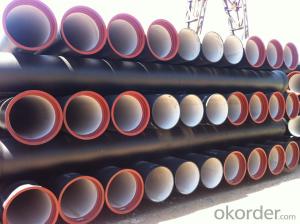Ductile Iron Pipe of China DN80-DN800 K8 EN545 Top Sale
- Loading Port:
- China main port
- Payment Terms:
- TT or LC
- Min Order Qty:
- 25 m.t.
- Supply Capability:
- 100000 m.t./month
OKorder Service Pledge
OKorder Financial Service
You Might Also Like
1. Ductile Iron Pipe Description :
1) Pipes confirm to ISO2531,K9 class,T type joint,6m long,with inside cements lining conform to ISO4179, outside Zinc spraying(130g/m2) and bitumen coating(70μm) conform to ISO8179.
2) Pipe ends: Spigot and socket ends, with 100% SBR rubber gaskets accoding to ISO4633
3) we can do third party inspection according to customer's request.
4) Our products have been sold to many international market, such as Middle East and South East Asia and Africa.
2. Main Features of the Ductile Iron Pipe:
•High yield strength
•High tensile Strength
•High corrosion resistance
•Pressure Resistence
•Anti-corrosion
•Installation is convenient
•Satisfy the highest hygienic standards
1).Service
• Drawing: we can translate your original drawing, offer best suggestion on design
• Quality: we have full set quality control system to guarantee the best quality.
• Inspection: inspect in house, all our products must be checked 3 times before packing
2)Inspection
• In-house Foundry
• Third party inspection available upon requirement
3) Our goal
• To be your preferred partner
3. Ductile Iron Pipe Images:
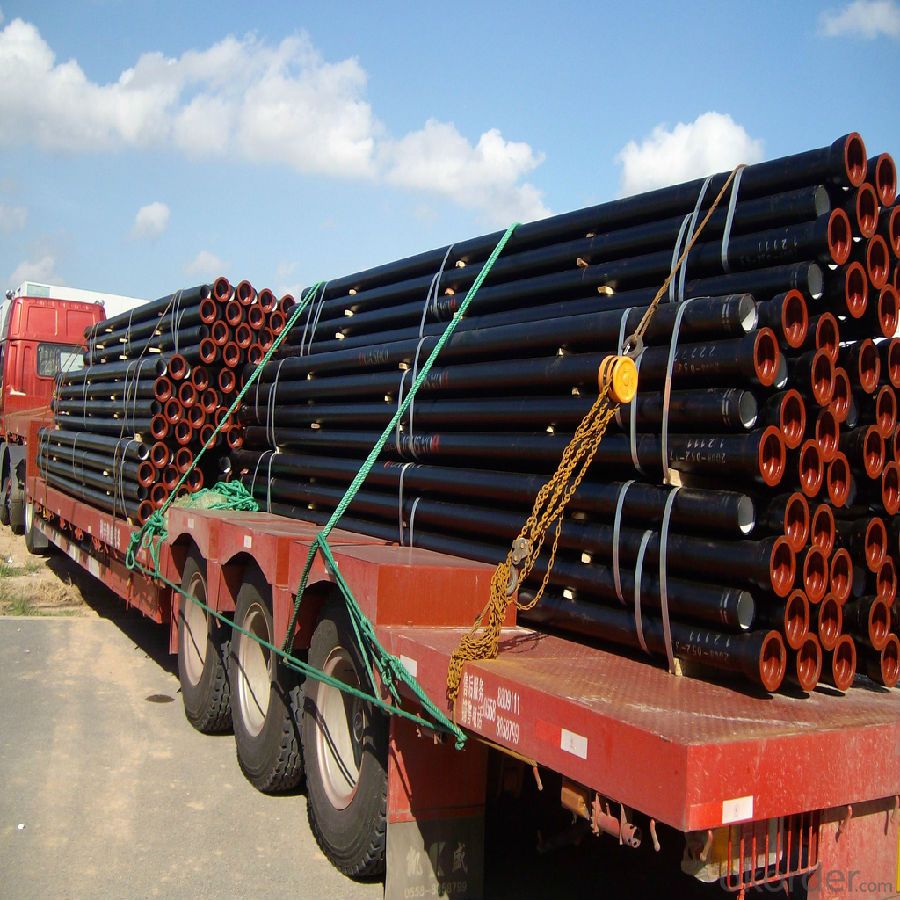
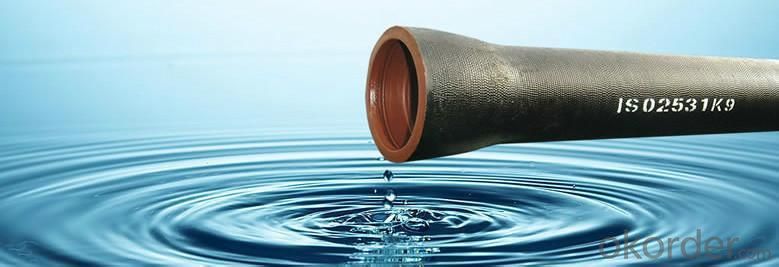
4. Ductile Iron Pipe Specification:
Surface Finishes: Bare, Oiled, Mill Varnish, Galv,FBE, FBE Dual, 3LPE, 3LPP, Coal Tar,Concrete Coating and Tape Wrap
End Finishes: Beveled, Square Cut, Threaded, hat
Additional Services: Internal Coating
Inspection: MOODY SGS BV GL DNV ABS LIOYD’S
Test: X-ray, UT, magnetic particle,inspection,hydrostatic test.
Processing service: Beveling, Threading, Slotting, Cut-to length, Bends, Quench and Temper, Fabrication, Double-jointing and On-site assistance
Documentary: MTC, material certification,Origin certification, CI or PI,Test Report, export licence, handling order, B/L,insurance policy,shipping instructions, contract, packing list etc.
Internal lining: ductile iron pipes shall have an internal cement mortar lining in acc with ISO4179.
External coating: ductile iron pipes shall be externally coated with metallic zinc spray plus a further layer of resin painting to ISO8179.
Gasket: 100% SBR/NBR/EPDM rubber gasket in accordance with ISO4633.
Packing: ductile iron pipes from DN100 to DN300 be bundled with steel belts, others are in bulk.
Payment term: L/C, T/T.
5. FAQ:
We have organized several common questions for our clients,may help you sincerely:
1.Q: Why would you choose ductile iron pipe rather than other pipe materials?
A:The reasons are obvious for that not only ductile iron pipe possesses the inherent strength and flexibility of ductile iron, combined with proven corrosion protection systems, but also the cost savings can be achieved from design to installation and commissioning.
2.Q:Why can you guarantee the inner of pipes can’t be corroded?
A: High alumina cement mortar lining and sulphate-resistant cement mortar lining. These two special linings are applicable to inner anti-corrosion for sewage pipes, improving resistance to erosion of the sewage components.
- Q: Can ductile iron pipes be used in high-pressure applications?
- Yes, ductile iron pipes can be used in high-pressure applications. Ductile iron pipes are known for their strength and durability, making them suitable for handling high-pressure fluids or gases. They have a higher pressure rating compared to other types of pipes, such as PVC or HDPE pipes. Ductile iron pipes also have excellent resistance to external loads and are capable of withstanding high internal pressures. These pipes are commonly used in water and wastewater systems, as well as in industrial applications where high-pressure conditions are present. It is important, however, to ensure that the ductile iron pipes used in high-pressure applications meet the required standards and specifications to ensure their safe and reliable operation.
- Q: Can ductile iron pipes be used for mining applications?
- Yes, ductile iron pipes can be used for mining applications. Ductile iron pipes possess excellent mechanical properties, such as high tensile strength, impact resistance, and durability, making them suitable for various demanding environments, including mining operations. These pipes can withstand heavy loads and pressures, making them ideal for transporting water, slurry, and other fluids used in mining processes. Additionally, ductile iron pipes have a smooth internal surface, minimizing friction and facilitating efficient flow of materials. Hence, they are widely used in applications such as dewatering, tailings disposal, and transporting corrosive or abrasive materials in the mining industry. Overall, ductile iron pipes are a reliable and cost-effective choice for mining applications due to their strength, durability, and suitability for demanding conditions.
- Q: What is the expected thermal expansion coefficient of ductile iron pipes?
- The expected thermal expansion coefficient of ductile iron pipes varies depending on several factors, including the specific composition of the iron and the temperature range in which the pipes are being used. However, as a general guideline, the thermal expansion coefficient of ductile iron pipes typically falls within the range of 10 to 14 x 10^-6 per degree Celsius (10-14 μm/m°C). This means that for every degree Celsius increase in temperature, a ductile iron pipe will expand by approximately 10 to 14 micrometers per meter of length. It is important to note that these values are approximate and may vary depending on the specific conditions and application of the pipes.
- Q: Can ductile iron pipes be used for pressure relief systems?
- Yes, ductile iron pipes can be used for pressure relief systems. Ductile iron pipes are known for their strength, durability, and ability to withstand high pressures. They are commonly used in various applications, including pressure relief systems, where they can effectively handle and dissipate excess pressure to ensure the safety and functionality of the overall system.
- Q: How are ductile iron pipes protected against internal scaling or buildup?
- Ductile iron pipes are protected against internal scaling or buildup through various methods. One of the most common methods is the application of cement mortar lining on the inner surface of the pipes. This lining acts as a protective barrier, preventing the formation of scale or buildup and ensuring a smooth flow of water or other fluids. Additionally, the pipes can be coated with a layer of polyethylene or other suitable materials to provide an extra level of protection against scaling or buildup. This coating acts as a barrier between the water and the iron surface, reducing the chances of corrosion or scale formation. Regular maintenance and cleaning are also crucial in preventing internal scaling or buildup in ductile iron pipes. Flushing the pipes with high-pressure water or using chemical treatments can help remove any accumulated scale or debris, ensuring the pipes remain clean and functional. Furthermore, proper water treatment is important to minimize the risk of scaling or buildup. Implementing appropriate water treatment processes, such as pH adjustment or the use of corrosion inhibitors, can help maintain the quality of the water and prevent the formation of scale or buildup inside the pipes. In conclusion, ductile iron pipes are protected against internal scaling or buildup through various measures, including cement mortar lining, pipe coating, regular maintenance, cleaning, and proper water treatment. These measures ensure the longevity and efficiency of the pipes, minimizing the chances of clogging or reduced flow capacity.
- Q: How is ductile iron pipe installed?
- The installation of ductile iron pipe can be carried out using two different methods: trenchless technology or the open-cut method. When utilizing trenchless technology, a hole is drilled into the ground, and hydraulic jacks or winches are used to push or pull the ductile iron pipe into the hole. This approach minimizes disruptions to the surrounding environment and reduces the need for extensive excavation. On the other hand, the open-cut method involves excavating a trench to the necessary depth and width for the ductile iron pipe. The trench is then prepared by removing any debris or obstructions and ensuring a stable base. The pipe is subsequently lowered into the trench and aligned correctly with the assistance of laser or surveying equipment. Once the pipe is in place, joints are connected using either a rubber gasket or mechanical joint. The joints are carefully sealed to prevent any leakage. Backfill material is then meticulously placed around the pipe, ensuring proper compaction for stability and support. To avoid excessive settlement, the backfill is applied in layers. After completing the installation, the pipe undergoes testing to ensure its integrity. This may involve hydrostatic testing, where water is filled into the pipe and monitored for any signs of leakage or pressure loss. Overall, the installation of ductile iron pipe necessitates careful planning, excavation, alignment, joint connection, backfilling, and testing. It is crucial to adhere to industry standards and guidelines to achieve a successful and reliable installation that meets the required specifications.
- Q: Can ductile iron pipes be used for underground parking lot drainage?
- Ductile iron pipes are indeed suitable for drainage in underground parking lots. This robust material is frequently utilized in underground piping systems due to its strength and durability. It exhibits exceptional resistance to corrosion, making it an ideal choice for situations where the pipes will come into contact with moisture and water. Furthermore, ductile iron pipes possess considerable tensile strength, enabling them to bear heavy loads and endure the pressure exerted by vehicles in a parking lot. Consequently, opting for ductile iron pipes for underground parking lot drainage ensures a dependable and enduring solution.
- Q: What is the typical weight of ductile iron pipe?
- The weight of ductile iron pipe can differ based on its diameter and wall thickness. In general, a 6-inch diameter ductile iron pipe with a wall thickness of 0.25 inches may weigh about 35 pounds per linear foot. Likewise, a 12-inch diameter ductile iron pipe with a wall thickness of 0.375 inches could weigh roughly 115 pounds per linear foot. It should be emphasized that these weight approximations are rough and may slightly differ depending on the manufacturer and product specifications.
- Q: How much is the working pressure of ductile iron pipe used in water supply pipe and how is MPa determined?
- No, the work pressure is generally 0.4~1.6MPa, but the ultimate test pressure of ductile iron pipes is about 4.0MPa.
- Q: What are the advantages and disadvantages of spheroidal graphite cast iron?
- Therefore, ductile iron pressure containing parts are treated with a ferritizing annealing cycle, the globular structure of ductile iron internal can also eliminate the crack phenomenon of iron easy to produce graphite flakes within the. In microscopic photographs of ductile iron, cracks can be seen and terminated after the parade of graphite balls. In the ductile iron industry, these graphite balls are called "crack terminator" because they have the ability to prevent fracture.
Send your message to us
Ductile Iron Pipe of China DN80-DN800 K8 EN545 Top Sale
- Loading Port:
- China main port
- Payment Terms:
- TT or LC
- Min Order Qty:
- 25 m.t.
- Supply Capability:
- 100000 m.t./month
OKorder Service Pledge
OKorder Financial Service
Similar products
Hot products
Hot Searches
Related keywords
